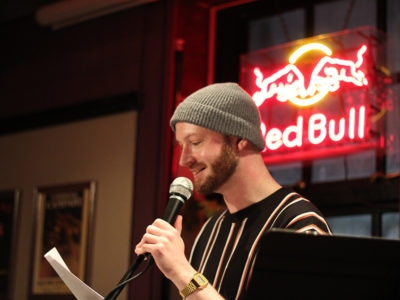When?
Monday 3 December, 6:30 pm – Free entry
Meet the poets!
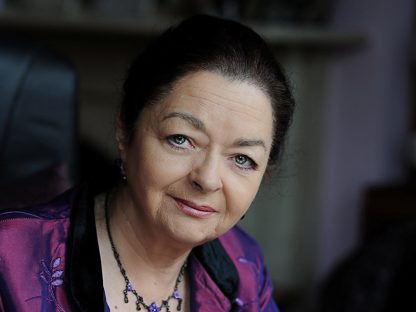
Celia de Freine
Celia de Fréine is not only a poet but a playwright and screenwriter. Originally from Northern Ireland, she moved to Dublin at a young age. He most recent published work is Cuir amach seo dom: riddle me this which is inspired by a traditional Slovene form of riddle. She says poetry reading events are important to reach out to people, especially those wishing to learn. “It is always an honour to meet students and answer any questions they may have about my poetry,” she explains.
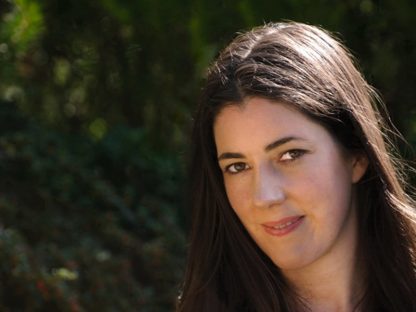
Afric Mac Aodha
Aifric Mac Aodha writes exclusively in Irish. Born in Dublin, she belongs to a modernist tradition of poetry. She published her first collection Gabháil Syrinx (The Capture of the Syrinx) in 2010. Aifric was awarded the Oireachtas Prize for poetry in 2017 for her collection Foreign News.
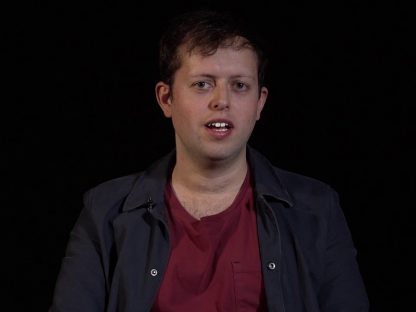
Llyr Gwyn Lewis
Llŷr Gwyn Lewis writes poetry in Welsh. His first collection of prose, Rhyw Flodau Rhyfel (Some Flowers of War) owed him an award in the 2015 Wales Book of the Year Award for Creative Non-Fiction. In 2017, he participated in the New Voices From Europe event in Barcelona which hosted poetry readings in various European languages. “It was very interesting to find so many different layers in poetry,” he explains.
Celia reads her poem Touch
Three acclaimed poets are to hold an evening of poetry reading to showcase their talent and honour their native languages, Irish and Welsh
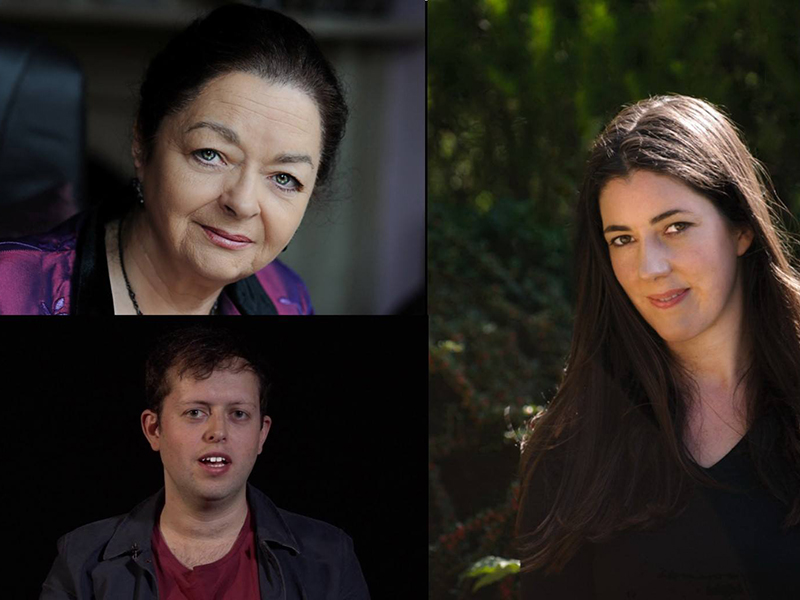
Ailbhe Darcy says the event is a great opportunity to put Irish and Welsh traditions in conversation with each other
The event will be held at The Flute and Tankard, just off Windsor Place, on Monday 3 December. Invited to read are two poets from Ireland, Celia de Fréine, who has received many awards for both her English and Irish work and Aifric Mac Aodha, who writes exclusively in Irish. Welsh poet Llŷr Gwyn Lewis, winner of the 2015 Wales Book of the Year Award in creative non-fiction, will also participate.
The event initially arose from a collaboration between two Irish associations, Poetry Ireland and Culture Ireland. They sponsor poetry readings in the UK through a program called Poets in the Cities and aim to promote Irish language, culture and tradition.
Ailbhe Darcy, the organiser of the event in Cardiff, decided to invite Llŷr to start a conversation on the similarities and differences between Welsh and Irish poetry. She explains, “One obvious similarity is this fact of bilingualism. Contemporary Irish poetry takes place in two languages, just like Welsh poetry.”
But she says that the poetry may also belong to two very separate traditions, influenced by different environments. “I’m interested in how these brilliant thinkers approach questions like these about language, nationality and tradition,” she says.
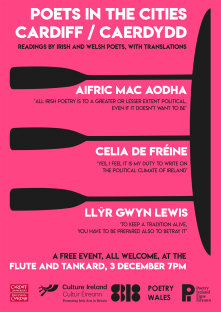
The event poster shows the three poets in the same boat
The poetry will be mostly read in either Irish or Welsh, with some English translations available. Llŷr says you don’t have to understand the words to appreciate them, “Poetry is close music and it can be listened to in the same way,” he says, “For example, with Cynghanedd verses, alliterations and rhyme are very important and everyone can hear those sounds.”
Ailbhe, who is herself an Irish poet living in Wales, says the best poetry provokes new thought in listeners and poems in different languages may do this in unexpected ways.
She hopes the event will interest many people, “It might even lead to some new poetry!”
When?
Monday 3 December, 6:30 pm – Free entry
Meet the poets!

Celia de Freine
Celia de Fréine is not only a poet but a playwright and screenwriter. Originally from Northern Ireland, she moved to Dublin at a young age. He most recent published work is Cuir amach seo dom: riddle me this which is inspired by a traditional Slovene form of riddle. She says poetry reading events are important to reach out to people, especially those wishing to learn. “It is always an honour to meet students and answer any questions they may have about my poetry,” she explains.

Afric Mac Aodha
Aifric Mac Aodha writes exclusively in Irish. Born in Dublin, she belongs to a modernist tradition of poetry. She published her first collection Gabháil Syrinx (The Capture of the Syrinx) in 2010. Aifric was awarded the Oireachtas Prize for poetry in 2017 for her collection Foreign News.

Llyr Gwyn Lewis
Llŷr Gwyn Lewis writes poetry in Welsh. His first collection of prose, Rhyw Flodau Rhyfel (Some Flowers of War) owed him an award in the 2015 Wales Book of the Year Award for Creative Non-Fiction. In 2017, he participated in the New Voices From Europe event in Barcelona which hosted poetry readings in various European languages. “It was very interesting to find so many different layers in poetry,” he explains.
Celia reads her poem Touch


